Key takeaways:
- Historical narratives shape our understanding of past events and highlight the importance of diverse perspectives in telling these stories.
- Reparations are seen as essential for acknowledging injustices, fostering healing, and empowering marginalized communities to reclaim their narratives.
- Case studies, such as reparations for Japanese Americans and Indigenous peoples, illustrate the complexities and potential impacts of reparative measures on community healing.
- The future of reparations politics may involve expanding definitions to include educational and community investments, emphasizing the need for genuine dialogue on equity.
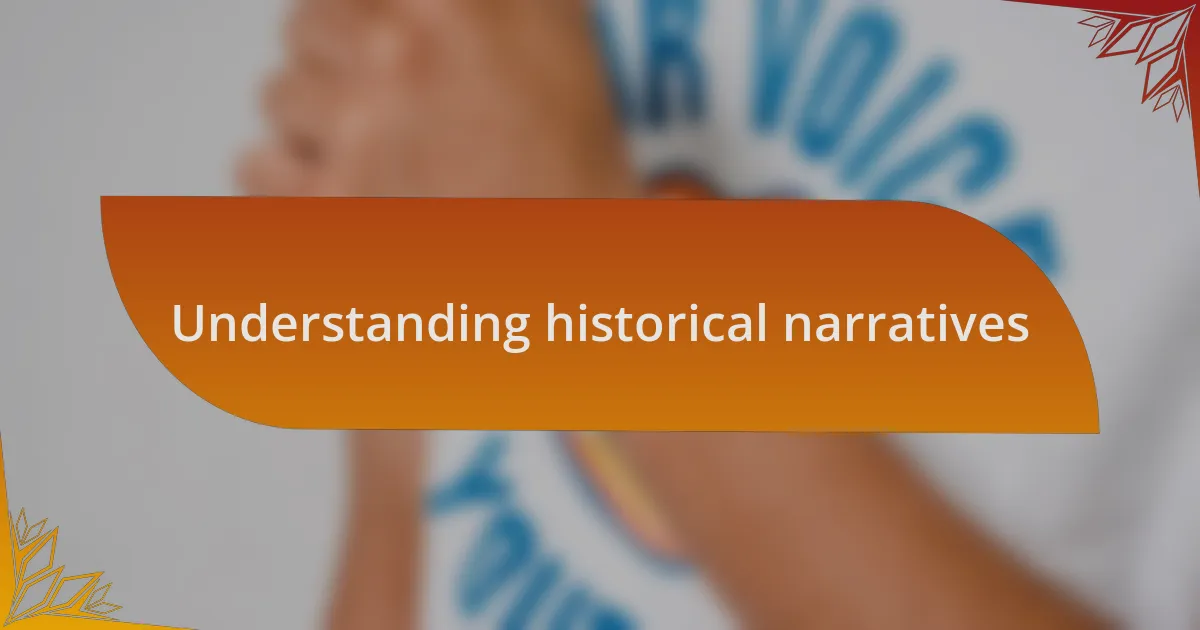
Understanding historical narratives
Understanding historical narratives is crucial because they shape our perception of past events and influence current social dynamics. I often find myself pondering how different perspectives can alter the understanding of pivotal moments in history. For instance, when I learned about the civil rights movement, I was struck by how the triumphs and struggles are often celebrated or marginalized based on who tells the story.
Consider the stories we hear about World War II. Growing up, I recall hearing predominantly about the heroism of soldiers, but what about the voices of those left behind or those who resisted? It makes me wonder: whose stories are we missing? Each narrative offers insights that could completely change the lens through which we view the conflict and its consequences.
As I reflect on my own educational experiences, I realize how selective histories can create a skewed understanding of cultural identities. I remember discussing the history of colonization in a class and feeling the weight of those silenced narratives. This reflection taught me that to engage meaningfully with history, we must seek out diverse narratives to grasp the complexities of our shared past.
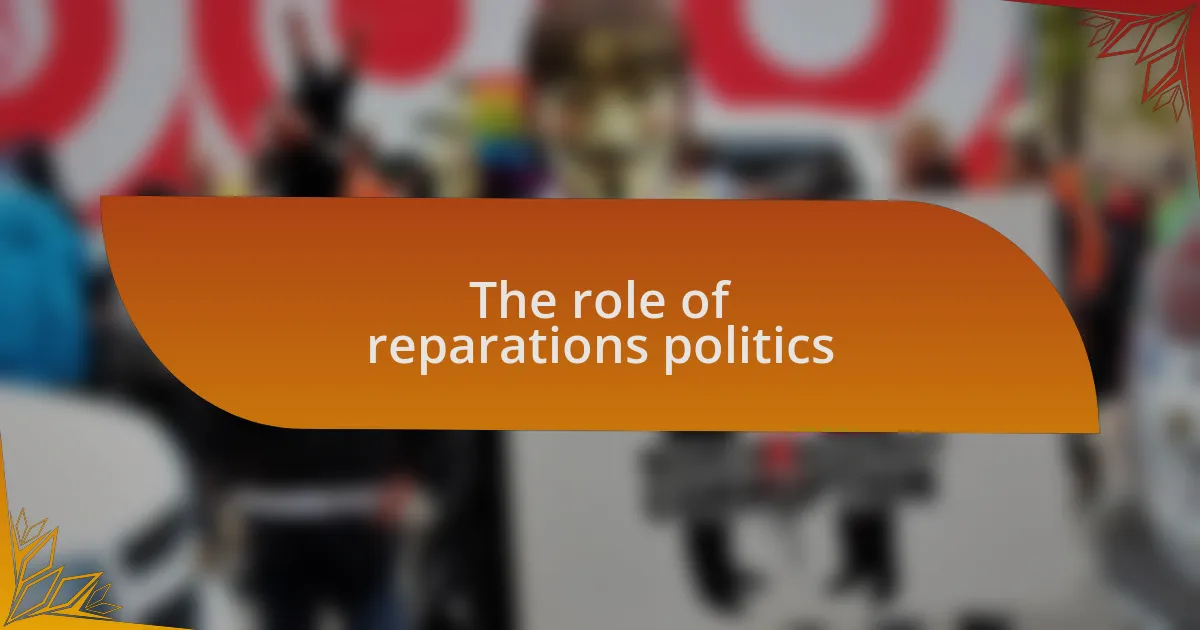
The role of reparations politics
Reparations politics operates at the intersection of history and justice, challenging societies to confront their legacies of discrimination and exploitation. I often think about how these discussions push us beyond just acknowledging past wrongs; they compel us to consider tangible actions towards healing. When I reflect on conversations within my community about reparations, I find that they often stir passionate debates about responsibility and the potential for reconciliation.
In my experience, reparations serve not just as a financial mechanism but as an acknowledgment of suffering and a commitment to change. I remember attending a town hall where a speaker shared their family’s history of land dispossession, and the room fell silent. That moment highlighted for me how reparations politics can open doors for dialogue about restitution and recognition, weaving personal histories into the larger tapestry of societal healing.
Moreover, the role of reparations politics can also amplify marginalized voices that have long been overlooked. I recall reading about the ongoing reparations advocacy for Indigenous peoples, which made me question why these narratives often receive less attention. This inquiry ignited my passion for understanding how reparations can empower communities, allowing them to reclaim the narratives that are rightfully theirs, and in doing so, shape a more equitable future for all.
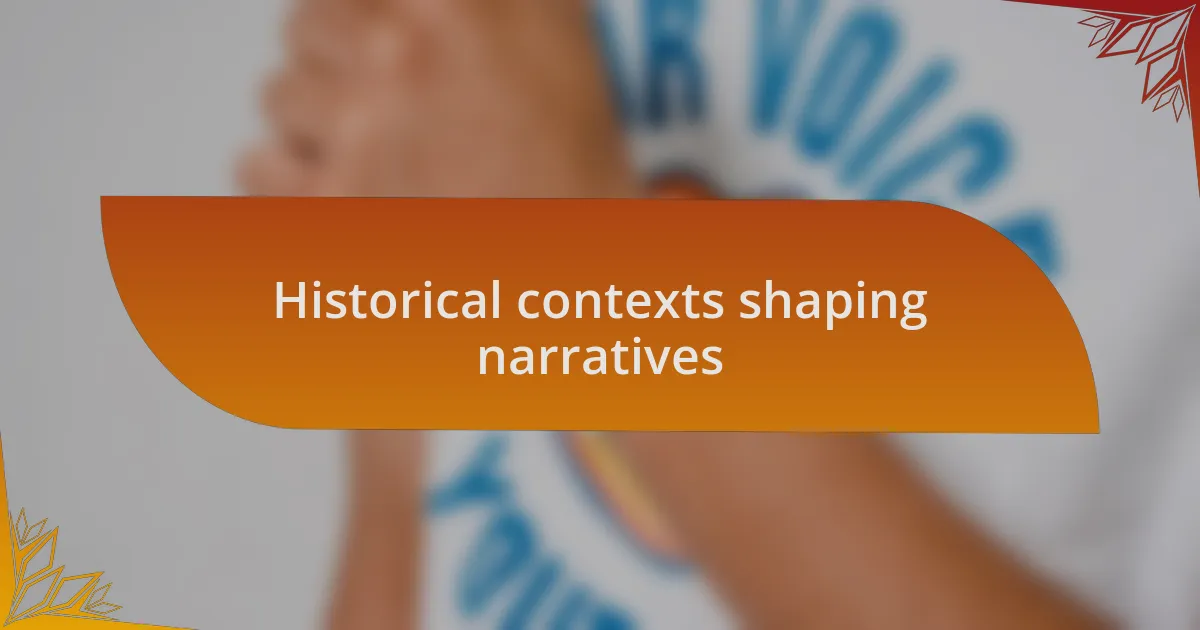
Historical contexts shaping narratives
Historical narratives are often shaped by the contexts in which they are created, influenced heavily by prevailing power dynamics and societal values. I find it intriguing how the stories we tell about the past can change over time, often reflecting the needs and priorities of those in power. For instance, when I learned about how textbooks in different regions depict the same events differently, it made me realize how history can be a tool for both empowerment and oppression, depending on who gets to write it.
Consider, for example, the impact of colonial histories on present-day narratives. I once attended a workshop focused on the legacy of colonialism, where we tackled the uncomfortable truth that many nations still wrestle with their past. This led me to reflect on how these histories not only shape national identities but also inform the ongoing conversations about reparations. When communities begin to grapple with these truths, fresh narratives emerge that advocate for justice and accountability.
Lastly, the emotional weight of historical context cannot be overstated. I vividly remember hearing a survivor’s account of systemic injustice, which illustrated the stark contrast between harsh realities and sanitized versions of history often told in mainstream media. This personal story underscored for me the vital importance of listening to diverse perspectives, as they enrich our understanding and push us toward more inclusive narratives that demand reparative justice. What stories do we choose to uplift, and how do they shape our collective consciousness? Engaging with these questions leads to a deeper comprehension of our shared history and its implications for the future.
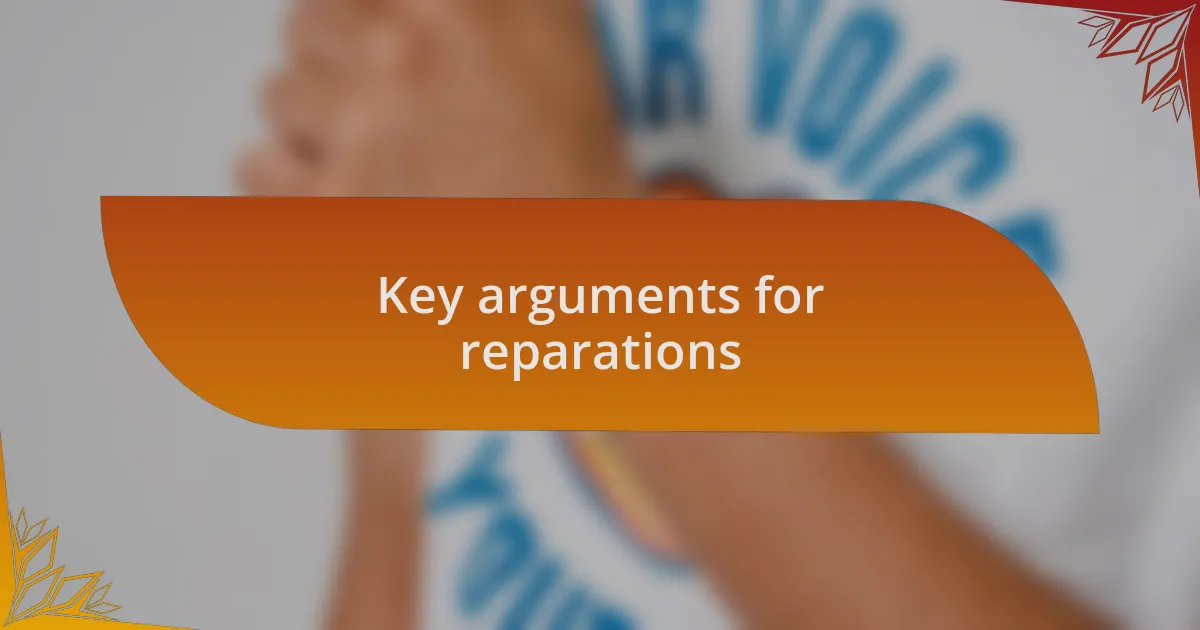
Key arguments for reparations
Reparations are often justified as a means of acknowledging and addressing historical injustices, especially in cases where entire communities have suffered systemic oppression. From my perspective, recognizing this debt is crucial; it offers a tangible way to confront the wrongs of the past. One time, while discussing this topic with friends, I realized many felt a sense of moral obligation to right historical wrongs, which sparked a rich conversation about our responsibilities in the present.
Additionally, the idea of reparations serves as a pathway toward healing and reconciliation. I once attended a community meeting where survivors shared their stories of pain and loss due to past injustices. Their raw emotions were palpable, illustrating how unresolved trauma can persist across generations. It made me consider—how can we hope to move forward if we do not acknowledge and repair the harm done? This question lingered with me long after the meeting, reinforcing the importance of reparative efforts.
Financial reparations can also lead to significant societal change. Consider the example of scholarship programs funded through reparative initiatives, aimed at providing educational opportunities for historically marginalized groups. I have seen firsthand how these opportunities can empower individuals and alter the trajectory of entire communities. When we invest in those communities that have borne the brunt of injustice, we’re not just offering compensation; we’re seeding a future built on equity and understanding. Isn’t that something we should all strive for?
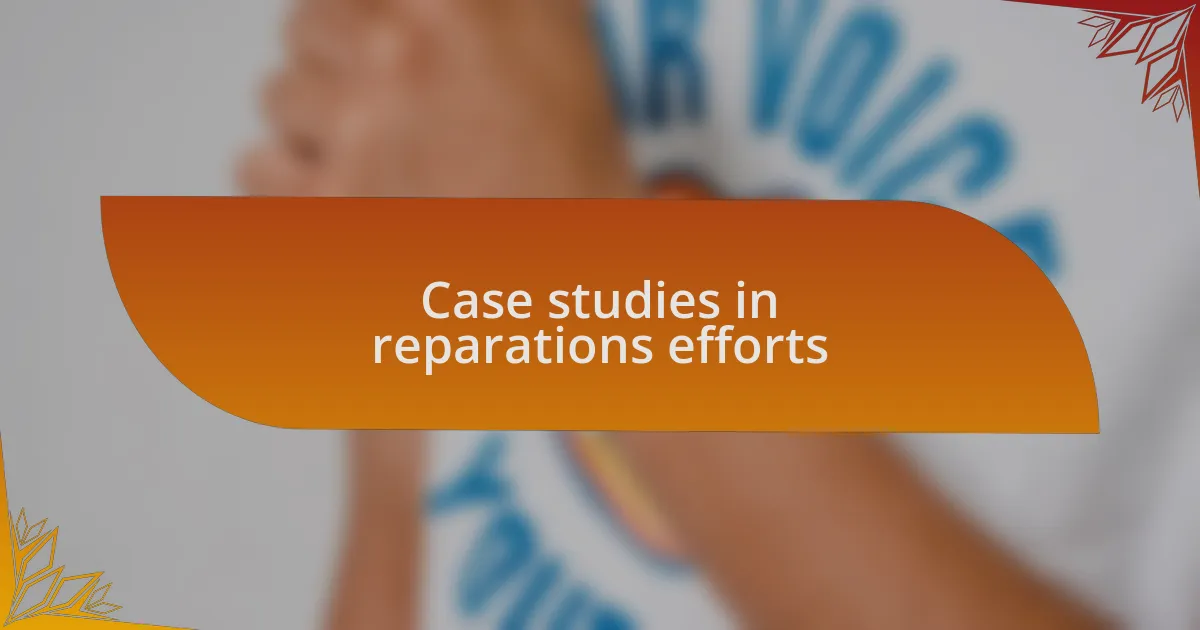
Case studies in reparations efforts
When examining case studies in reparations efforts, one that stands out is the reparations provided to Japanese Americans for internment during World War II. The U.S. government allocated $20,000 to each surviving internee, an acknowledgment of the wrongs they faced. Reflecting on this, I wonder how such a significant gesture impacted their sense of justice and belonging. Did this financial acknowledgment help heal the wounds of such a traumatic experience?
I remember attending a seminar on reparations for Indigenous peoples, which highlighted the ongoing struggles in Canada. The Truth and Reconciliation Commission’s efforts aimed to address the injustices of residential schools, offering reparations that include educational scholarships and land reinstatement. Listening to activists share their dreams of revitalized communities filled me with hope. It made me question how much more could be done if restorative practices became the norm rather than the exception.
The case of reparations for slavery in the Caribbean demonstrates another layer of complexity. In Barbados, the government has started to explore reparative measures through grants and social programs to address the lasting impacts of colonialism. Observing discussions surrounding these initiatives, I felt a deep connection to the theme of resilience. Can reparations truly reshape a narrative of oppression into one of empowerment? It’s a crucial conversation that speaks to the heart of what justice can look like.
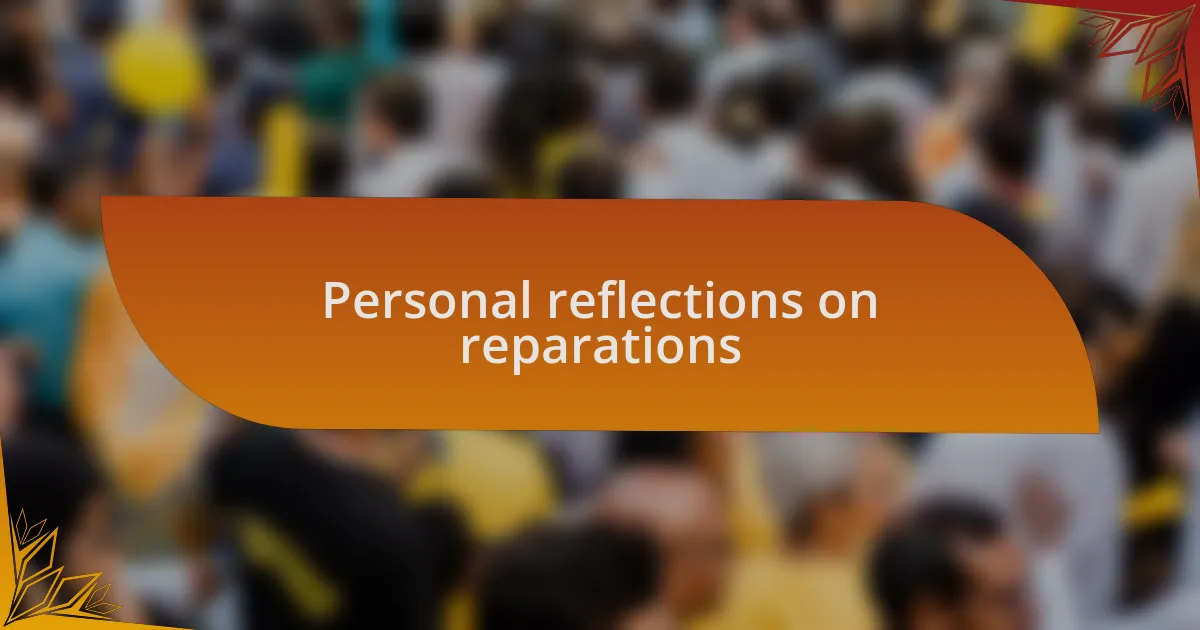
Personal reflections on reparations
Reflecting on the topic of reparations, I often find myself grappling with the emotional weight it carries. I once spoke with a dear friend whose family has long sought recognition for the injustices they endured due to historical oppression. Hearing her recount the stories of her ancestors ignited a deep understanding of how reparations go beyond financial compensation; they are about restoring dignity and honoring history. What would it mean for future generations if acknowledgment became a standard part of our societal fabric?
During a community gathering, I witnessed a powerful moment when individuals shared how reparations could serve as a bridge for healing. People from different backgrounds came together to discuss personal grievances and collective traumas. In that space, I felt the palpable tension of hope intertwined with skepticism. Can true reconciliation be achieved if we only address monetary compensation, or do we also need to confront the deeper societal attitudes that perpetuate inequality?
I often reflect on the stories my grandparents told me about their struggles. They lived through times of blatant discrimination and injustice, which is why I’m passionate about the reparations debate. I believe it’s crucial to consider how reparative actions can foster intergenerational healing. Could recognizing these past injustices lead to a stronger sense of community and shared responsibility? It’s something that continues to weigh heavily on my heart as I engage with this important dialogue.
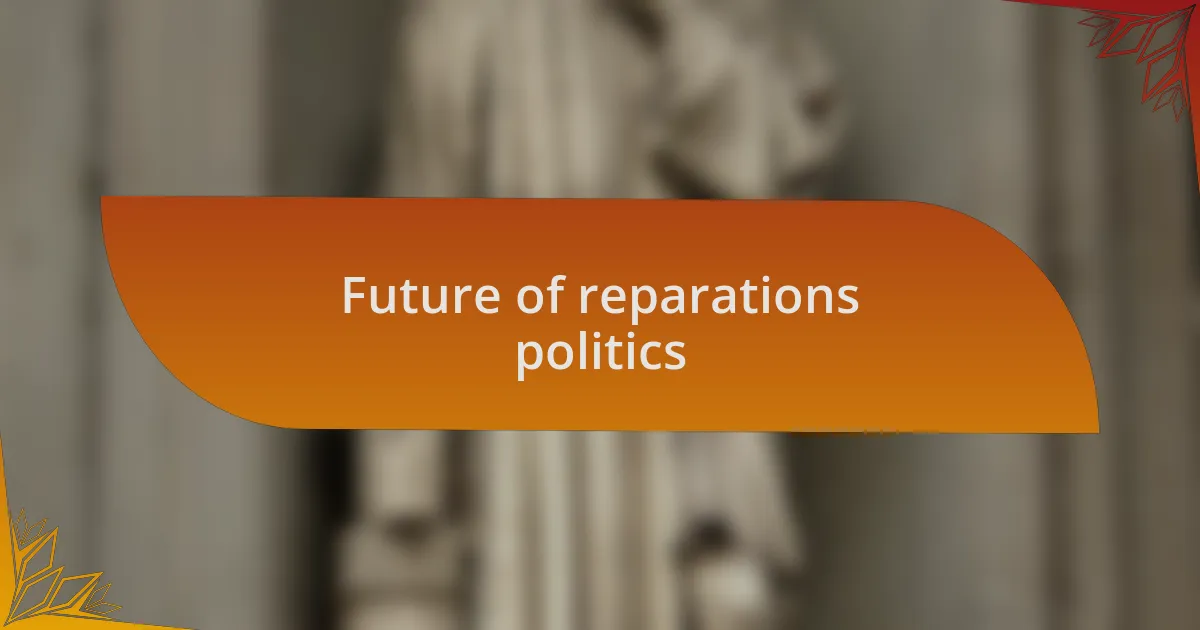
Future of reparations politics
As I envision the future of reparations politics, I often wonder how society will prioritize these discussions. Are we prepared to create policies that not only address past injustices but also foster genuine dialogues about race and equity? I recall a town hall meeting where the conversation shifted from financial reparations to community investments, igniting a fervent discussion about how we can transform pain into progress.
The path forward may require us to broaden our understanding of reparations, integrating new models that acknowledge systemic disparities in education, healthcare, and housing. I saw firsthand how a local initiative to boost educational funding in marginalized communities brought renewed hope and vitality. What if expanding reparations to include educational grants could empower future generations and reshape narratives around opportunity?
Then there’s the critical role of storytelling in this context. I remember hosting a workshop where participants shared their personal experiences related to historical injustices. The raw emotion in the room was a powerful reminder that reparations isn’t just a policy issue; it’s a deeply personal one that demands compassion and understanding. How can we ensure that these narratives shape our policy decisions in a way that resonates with the collective experience of those affected?